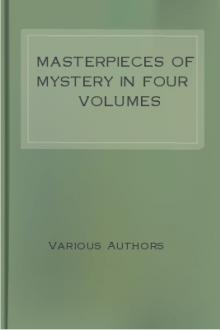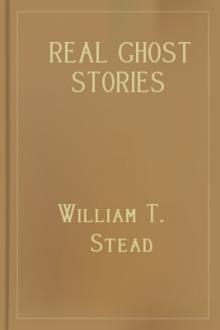Varney the Vampire; Or, the Feast of Blood by Prest and Rymer (ereader iphone .txt) 📗

- Author: Prest and Rymer
Book online «Varney the Vampire; Or, the Feast of Blood by Prest and Rymer (ereader iphone .txt) 📗». Author Prest and Rymer
He, therefore, walked up the lawn without making the least attempt at concealment, and when he reached the house he allowed his footsteps to make what noise they would upon the stone steps which led up to it. But no one appeared; nor was there, either by sight or by sound, any indication of the presence of any living being in the place besides himself.
Insensibly, as he contemplated the deserted place around him, the solemn sort of stillness began to have its effect upon his imagination, and, without being aware that he did so, he had, with softness and caution, glided onwards, as if he were bent on some errand requiring the utmost amount of caution and discrimination in the conduction of it.
And so he entered the hall of the house, where he stood some time, and listened with the greatest attention, without, however, being able to hear the least sound throughout the whole of the house.
"And yet he must be here," thought Charles to himself; "I was not gone many minutes, and it is extremely unlikely that in so short a space of time he has left, after taking so much trouble, by making such a detour around the meadows to get here, without being observed. I will examine every room in the place, but I will find him."
Charles immediately commenced going from room to room of that house in his search for the vampyre. There were but four apartments upon the ground floor, and these, of course, he quickly ran through. Nothing whatever at all indicative of any one having been there met his gaze, and with a feeling of disappointment creeping over him, he commenced the ascent of the staircase.
The day had now fairly commenced, so that there was abundance of light, although, even for the country, it was an early hour, and probably Mr. Nash had been not a little surprised to have a call from one whose appearance bespoke no necessity for rising with the lark at such an hour.
All these considerations, however, sank into insignificance in Charles's mind, compared with the object he had in view, namely, the unravelling the many mysteries that hung around that man. He ascended to the landing of the first story, and then, as he could have no choice, he opened the first door that his eyes fell upon, and entered a tolerably large apartment. It was quite destitute of furniture, and at the moment Charles was about to pronounce it empty; but then his eyes fell upon a large black-looking bundle of something, that seemed to be lying jammed up under the window on the floor—that being the place of all others in the room which was enveloped in the most shadow.
He started back involuntarily at the moment, for the appearance was one so shapeless, that there was no such thing as defining, from even that distance, what it really was.
Then he slowly and cautiously approached it, as we always approach that of the character of which we are ignorant, and concerning the powers of which to do injury we can consequently have no defined idea.
That it was a human form there, was the first tangible opinion he had about it; and from its profound stillness, and the manner in which it seemed to be laid close under the window, he thought that he was surely upon the point of finding out that some deed of blood had been committed, the unfortunate victim of which was now lying before him.
Upon a nearer examination, he found that the whole body, including the greater part of the head and face, was wrapped in a large cloak; and there, as he gazed, he soon found cause to correct his first opinion at to the form belonging to the dead, for he could distinctly hear the regular breathing, as of some one in a sound and dreamless sleep.
Closer he went, and closer still. Then, as he clasped his hands, he said, in a voice scarcely above a whisper,—
"It is—it is the vampyre."
Yes, there could be no doubt of the fact. It was Sir Francis Varney who lay there, enveloped in the huge horseman's cloak, in which, on two or three occasions during the progress of this narrative, he had figured. There he lay, at the mercy completely of any arm that might be raised against him, apparently so overcome by fatigue that no ordinary noise would have awakened him.
Well might Charles Holland gaze at him with mingled feelings. There lay the being who had done almost enough to drive the beautiful Flora Bannerworth distracted—the being who had compelled the Bannerworth family to leave their ancient house, to which they had been bound by every description of association. The same mysterious existence, too, who, the better to carry on his plots and plans, had, by dint of violence, immured him, Charles, in a dungeon, and loaded him with chains. There he lay sleeping, and at his mercy.
"Shall I awaken him," said Charles, "or let him sleep off the fatigue, which, no doubt, is weighing down his limbs, and setting heavily on his eyelids. No, my business with him is too urgent."
He then raised his voice, and cried,—
"Varney, Varney, awake!"
The sound disturbed, without altogether breaking up, the deep slumber of the vampyre, and he uttered a low moan, and moved one hand restlessly. Then, as if that disturbance of the calm and deep repose which had sat upon him, had given at once the reins to fancy, he begin to mutter strange words in his sleep, some of which could be heard by Charles distinctly, while others were too incoherently uttered to be clearly understood.
"Where is it?" he said; "where—where hidden?—Pull the house down!—Murder! No, no, no! no murder!—I will not, I dare not. Blood enough is upon my hands.—The money!—the money! Down, villains! down! down! down!"
What these incoherent words alluded to specifically, Charles, of course, could not have the least idea, but he listened attentively, with a hope that something might fall from his lips that would afford a key to some of the mysterious circumstances with which he was so intimately connected.
Now, however, there was a longer silence than before, only broken occasionally by low moans; but suddenly, as Charles was thinking of again speaking, he uttered some more disjointed sentences.
"No harm," he said, "no harm,—Marchdale is a villain!—Not a hair of his head injured—no, no. Set him free—yes, I will set him free. Beware! beware, Marchdale! and you Mortimer. The scaffold! ay, the scaffold! but where is the bright gold? The memory of the deed of blood will not cling to it. Where is it hidden? The gold! the gold! the gold! It is not in the grave—it cannot be there—no, no, no!—not there, not there! Load the pistols. There, there! Down, villain, down!—down, down!"
Despairing, now, of obtaining anything like tangible information from these ravings, which, even if they did, by accident, so connect themselves together as to seem to mean something, Charles again cried aloud,—
"Varney, awake, awake!"
But, as before, the sleeping man was sufficiently deaf to the cry to remain, with his eyes closed, still in a disturbed slumber, but yet a slumber which might last for a considerable time.
"I have heard," said Charles, "that there are many persons whom no noise will awaken, while the slightest touch rouses them in an instant. I will try that upon this slumbering being."
As he spoke, he advanced close to Sir Francis Varney, and touched him slightly with the toe of his boot.
The effect was as startling as it was instantaneous. The vampyre sprang to his feet, as he had been suddenly impelled up by some powerful machinery; and, casting his cloak away from his arms, so as to have them at liberty, he sprang upon Charles Holland, and hurled him to the ground, where he held him with a giant's gripe, as he cried,—
"Rash fool! be you whom you may. Why have you troubled me to rid the world of your intrusive existence?"
The attack was so sudden and so terrific, that resistance to it, even if Charles had had the power, was out of the question. All he could say, was,—
"Varney, Varney! do you not know me? I am Charles Holland. Will you now, in your mad rage, take the life you might more easily have taken when I lay in the dungeon from which you released me?"
The sound of his voice at once convinced Sir Francis Varney of his identity; and it was with a voice that had some tones of regret in it, that he replied,—
"And wherefore have you thought proper, when you were once free and unscathed, to cast yourself into such a position of danger as to follow me to my haunt?"
"I contemplated no danger," said Charles, "because I contemplated no evil. I do not know why you





Comments (0)